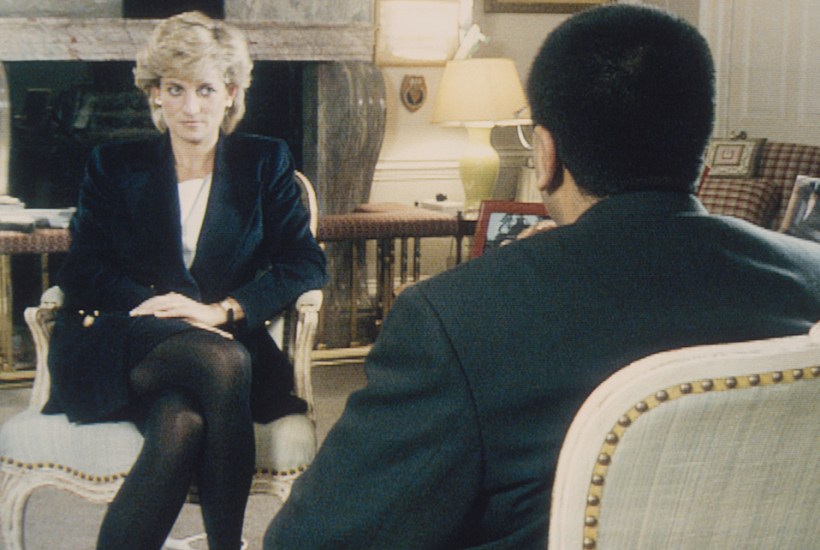I have become rather obsessed with Martin Bashir and his downfall. Three years ago, I began researching for a play based around his infamous 1995 Panorama interview with Diana, Princess of Wales, which he secured by forging bank statements and reinforcing her belief that there was an Establishment conspiracy against her. When I started writing I thought I would soon understand him. But he still baffles me. When we corresponded recently via email, he suggested playing himself on stage or, failing that, what about Idris Elba? I couldn’t tell if he was joking.
I knew Bashir pretty well back in the day. We were fellow reporters at the BBC and ITV for 13 years. He even joined my covers band Surf’n’Turf on percussion, and very good he was too. He was a world-class flatterer, forever telling people how brilliant they were and how it was his life’s ambition to work with them. Most saw through his smoke-up-the-fundament routine, but plenty didn’t.
What fascinates me is how exactly he finally managed to win Diana’s confidence. The document-forging got him through the door, but how did she come to trust him enough to let him make her pasta and pesto in her kitchen? And why did he become the Malcolm X of journalism, getting the story by any means necessary? How did he justify it to himself?
Let’s get the obvious stuff out of the way first. Bashir’s methods were wrong and maybe sociopathic. As well as forging documents, he fed Diana a series of lurid (and possibly libellous) stories during his intense pre-interview wooing of her. So I’m not defending him. But as with most scandals, the truth is less Manichean than the received wisdom of Diana=angel, Bashir=devil.
It is absurd, for example, to blame him for her death, as some have done. Had he not tricked her into the interview, they say, she would have remained part of the royal family, had professional security, and lived. Leaving aside the fact that this denies Diana any agency – she desperately wanted to do an interview, it was just a question of who with – there are surely more plausible scapegoats: the chauffeur Henri Paul; Mohamed Al-Fayed’s security team; the paparazzi. Or the dysfunctional, vengeful institution that chewed her up and spat her out.
To blame Bashir is also to absolve the bigger sinner: the BBC. As with Jimmy Savile, senior executives knew about the wrong-doing but failed to act. I am not for one moment comparing Bashir’s actions to Savile’s. But there are similarities in the way both scandals were handled.
When Bashir admitted his forgeries to the then BBC head of news Tony Hall, just months after the 1995 interview, he was forgiven instantly. Hall – and this would have been a tough call, admittedly – should have sacked him and apologised publicly. Instead, the BBC continued to pat itself on the back for its scoop and pretend all was well until 2020, when the investigative journalist Andy Webb re-ignited the story. After the Mail on Sunday had carried news of the forging in 1996, hear-no-evil-see-no-evil BBC execs dismissed it as a tabloid smear, motivated by commercial interests. It turned out the terrible tabloid was right all along.
But the 1995 interview isn’t just a go-to example of dodgy journalistic practice. It is much more valuable than that: the perfect lens through which to examine Diana and to understand her more. On the one hand, it shows her extraordinary bravery in single-handedly taking on a powerful institution. On the other, it demonstrates her acute lack of strategic judgment. After she went in all guns blazing about the future King, it was never going to end well. As her former aide Patrick Jephson argues, if she’d been diplomatic, and forgiven his extracurricular activities for the sake of her country and her boys, she’d have won the PR game 5-0. Quite possibly she would have become queen.
The most important issue of all, obscured by all the Bashir bashing, is how the interview was effectively banned. Prince William has decreed ‘it is my firm view that [it] holds no legitimacy and should never be aired again’. Well, it’s my view – and that of many media executives – that his edict, immediately and cravenly agreed to by the BBC, is blatant censorship. The interview is an important historical document. It highlighted issues like depression and self-harm which, until then, were rarely discussed.
So why are the BBC and William behaving like this? There’s dramatic irony here. The son Diana brought up to have the courage to speak out silenced his own mother for having the courage to speak out.
Got something to add? Join the discussion and comment below.
Get 10 issues for just $10
Subscribe to The Spectator Australia today for the next 10 magazine issues, plus full online access, for just $10.
You might disagree with half of it, but you’ll enjoy reading all of it. Try your first month for free, then just $2 a week for the remainder of your first year.








Comments
Don't miss out
Join the conversation with other Spectator Australia readers. Subscribe to leave a comment.
SUBSCRIBEAlready a subscriber? Log in